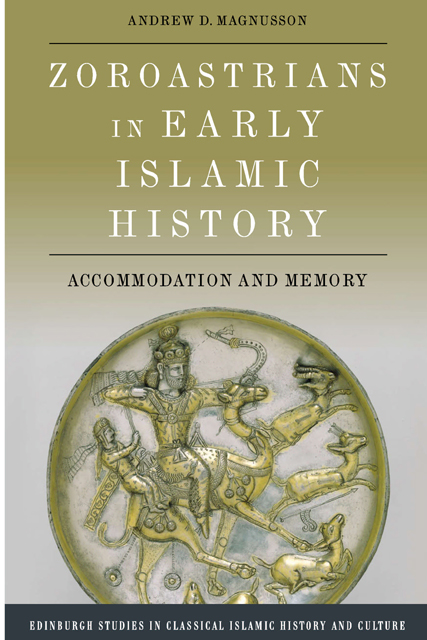Book contents
- Frontmatter
- Contents
- Acknowledgements
- A Note on Transliteration and Abbreviation
- Dedication
- Introduction: Zoroastrianism, Islam and Accommodation
- 1 Myth and Countermyth in Zoroastrian Historiography
- 2 Umar’s Dilemma: The Taxation of People Without a Book
- 3 Marriage, Meat and the Limits of Accommodation
- 4 Salman’s Charter as a Site of Memory
- 5 Fire Temple Desecration and Triumphal Tales of Violence
- 6 Rhetorical Zoroastrians in Early Islamic Discourse
- Conclusion: An Ambivalent Accommodation
- Appendix A Translation of an Iranian Recension of Salman’s Charter
- Appendix B Translation of an Indian Recension of Salman’s Charter
- Bibliography
- Index
2 - Umar’s Dilemma: The Taxation of People Without a Book
Published online by Cambridge University Press: 25 April 2023
- Frontmatter
- Contents
- Acknowledgements
- A Note on Transliteration and Abbreviation
- Dedication
- Introduction: Zoroastrianism, Islam and Accommodation
- 1 Myth and Countermyth in Zoroastrian Historiography
- 2 Umar’s Dilemma: The Taxation of People Without a Book
- 3 Marriage, Meat and the Limits of Accommodation
- 4 Salman’s Charter as a Site of Memory
- 5 Fire Temple Desecration and Triumphal Tales of Violence
- 6 Rhetorical Zoroastrians in Early Islamic Discourse
- Conclusion: An Ambivalent Accommodation
- Appendix A Translation of an Iranian Recension of Salman’s Charter
- Appendix B Translation of an Indian Recension of Salman’s Charter
- Bibliography
- Index
Summary
In 120/737–738, a landed notable (N.P., dihqān) of Herat addressed an aristocratic assembly at Balkh during the feast of Mihrijan, a Persian celebration of the autumnal equinox once closely associated with Zoroastrianism. His speech heaped praise on the visiting Umayyad governor of Khurasan, Asad ibn Abd Allah al-Qasri, by comparing al-Qasri’s noble leadership to that of the pre-Islamic Sasanians. ‘We are a group of non-Arabs (Ar., ‘ajam). We ruled the world for 400 years. We ruled it with forbearance, reason, and dignity [even though] we did not have a divinely inspired scripture (kitāb nāṭiq) nor a divinely commissioned prophet (nabī mursal).’ The themes around which this notable constructed his backhanded compliment of the emperors of Persia seem to imply that he was a Muslim. The dihqan, like most Muslims before the tenth century, believed that Zoroastrians lacked a recognised prophet and book of scripture, at least as defined in Islamic terms.
Even among Zoroastrians, the relative importance of Zoroaster and the
Avesta seems to have increased over the centuries. Although Zoroaster’s name has become synonymous with the faith, particularly for outsiders, Jenny Rose notes that he did not always enjoy the distinctive status that he currently holds in the Good Religion. Michael Stausberg has argued that Zoroastrians identified and promoted the Avesta as their scripture in the centuries after the Islamic conquest of Iran. Contact with Muslims undoubtedly influenced these developments to some extent, yet scholars have paid insufficient attention to it. This is despite the fact that Arabic sources preserve a wealth of information about the Good Religion as Muslim bureaucrats, collectors of hadith and jurists discussed Zoroastrians’ status relative to People of the Book.
The term ‘People of the Book’ (Ar., ahl al-kitāb) is a Qur’anic designation for religious communities that possessed a divinely revealed book of scripture before the advent of Islam. The Qur’an mentions two such books (3: 3): the Torah (tawrāt) given to Moses and the Gospel (injīl) given to Jesus. As a result, Muslims considered Jews and Christians to be People of the Book. The Qur’an placed Jews and Christians – and a mysterious third group, the Sabi’ans – on equal footing with Muslims regarding the possibility of salvation (2: 62, 5: 69).
- Type
- Chapter
- Information
- Zoroastrians in Early Islamic HistoryAccommodation and Memory, pp. 33 - 54Publisher: Edinburgh University PressPrint publication year: 2022



